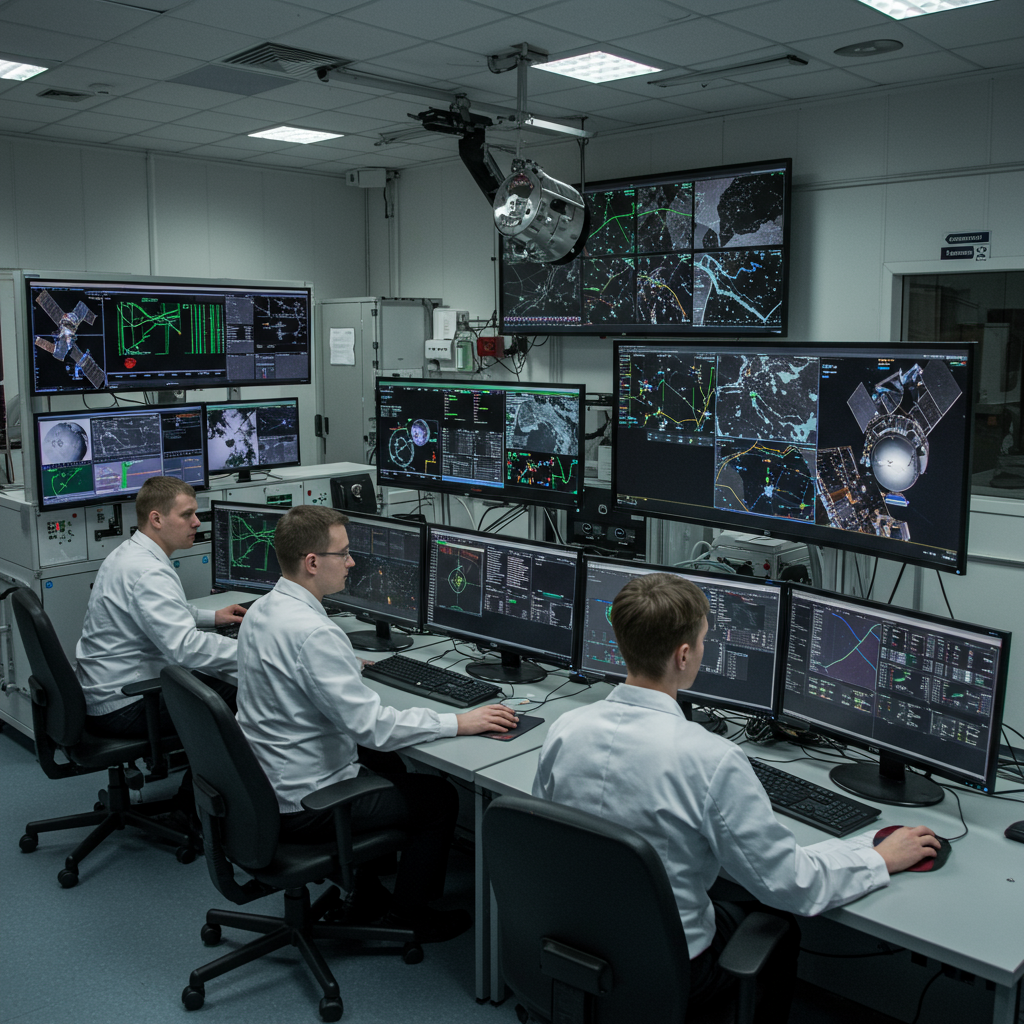Tiny Lithuania is quietly forging a significant presence in the global space technology arena. Far from the traditional space powers, this Baltic nation is leveraging its agility and focus on niche innovations to develop critical capabilities. These advancements are not only pushing the boundaries of space exploration but are increasingly vital for national security and defense, particularly given the current volatile geopolitical climate.
The country’s ambition is perhaps best embodied within unassuming buildings, like the Vilnius Tech University. Here, cutting-edge startups are redefining what’s possible in orbit and beyond.
Pioneers of the Optical Data Highway
A prime example is Astrolight, a dynamic six-year-old venture based in Vilnius. This company is at the forefront of developing laser-based communication systems. Think of their technology as invisible, high-speed internet connections designed to link satellites with ground stations. This is a critical development in an era where tens of thousands of new satellites are expected to launch in the next five years.
Astrolight recently secured €2.8 million ($3.3m; £2.4m) in funding to accelerate the creation of what they term an “optical data highway.” Their goal is to shift satellite communication away from traditional, often congested, radio frequencies. Laser technology promises faster data transfer, enhanced security, and significantly higher bandwidth. This transition is crucial for managing the immense data flow from the projected satellite boom.
Space Tech and National Defense
The applications of Astrolight’s laser technology extend directly into the defense sector. This is particularly timely given the ongoing geopolitical shifts and increased focus on security in Eastern Europe. The ability to transmit sensitive information quickly and securely is paramount for modern military operations.
Astrolight is already integrated into NATO’s Defence Innovation Accelerator for the North Atlantic (DIANA). Established in 2023, DIANA aims to adapt civilian technological innovations for defense challenges. NATO recognizes the immense potential of Astrolight’s secure, high-speed laser links. These systems are difficult to intercept or jam, offering a distinct advantage over radio communication.
The Lithuanian Navy proactively sought Astrolight’s expertise three years ago. They needed a reliable method for ships to communicate securely, even when maintaining radio silence. Astrolight’s co-founder and CEO, Laurynas Maciulis, notes the synergy. “We knew how to do it for space,” he explains, “and it turns out we can apply that same knowledge terrestrially.”
Low detectability is another key benefit for military users. Radio signals can easily reveal a transmitter’s location, making forces vulnerable in conflict zones like Ukraine. Laser communication, however, uses a very narrow beam. This makes it extremely difficult to detect or track, significantly enhancing operational security.
Lithuania’s Strategic Defence Investment
While Lithuania’s absolute defense budget, around £2.5 billion, is smaller than countries like the UK (£54bn), its investment strategy is highly strategic. When measured as a percentage of GDP, Lithuania dedicates approximately 3% to defense. This figure is set to rise to 5.5%. This commitment exceeds that of many larger nations, including the UK, which spends around 2.5% of its GDP on defense.
This significant investment reflects a clear understanding of the need to build resilience and security in the region. A substantial portion of this spending is directed towards acquiring and developing advanced technologies. Lithuania has demonstrated particular strength in niche tech areas like Astrolight’s laser systems. Its success in securing EU funding for space projects further underscores this capability, with 30% receiving grants compared to the EU average of 17%.
According to Šarūnas Genys from Invest Lithuania, space technology is rapidly becoming integral to the nation’s overall defense and resilience framework. This strategic integration highlights the understanding that capabilities in space directly impact security on the ground.
The Power of Dual-Use Technology
A key theme in Lithuania’s space sector is the inherent dual-use nature of the technology being developed. Innovations often have both civilian commercial applications and significant military potential. This maximizes the return on investment and fosters a vibrant ecosystem where advancements in one area can benefit another.
Delta Biosciences, a Lithuanian life sciences company, provides a compelling example. They are developing radiation-resistant medical compounds. While preparing a mission to test these on the International Space Station for spaceflight applications, the same compounds could also be crucial for special operations forces operating in environments with high radiation exposure.
Similarly, Vilnius-based Kongsberg NanoAvionics secured a major contract to build hundreds of satellites. While primarily intended for commercial purposes, this satellite infrastructure offers critical dual-use capabilities. It can support encrypted communications and enable real-time intelligence, surveillance, and reconnaissance (ISR). Such capabilities are invaluable for monitoring and securing NATO’s eastern flank.
Advancing Autonomous Space Operations
Complementing laser communication efforts, fellow Lithuanian startup Blackswan Space focuses on autonomous satellite navigation. Their “vision-based navigation system” aims to automate the programming and repositioning of satellites.
The founders argue that with the massive increase in satellite numbers, human operators on the ground simply won’t be able to keep up. Their technology allows satellites to operate independently, managing complex orbital maneuvers without constant manual input.
In a defense context, this same technology has potent applications. It could potentially be used to remotely destroy enemy satellites or create realistic battle simulations for soldier training.
Addressing Funding and Future Strategy
Despite the technological innovation, challenges remain. Tomas Malinauskas, Blackswan Space’s chief commercial officer, acknowledges that selling advanced space tech to the Lithuanian military hasn’t always been straightforward. He also voices concern that current government funding levels might not fully match the pace of innovation.
Malinauskas proposes a strategic shift: instead of spending large sums on foreign-made assets like a $300 million drone, Lithuania could invest in its own constellation of small satellites. This, he argues, would build sovereign capability for communication and intelligence gathering. “It would be a big boost for our small space community,” Malinauskas states, “and a long-term, sustainable value-add for the Lithuanian military.”
Eglė Elena Šataitė, head of Space Hub LT, a government-funded agency supporting space companies, confirms the government’s awareness. “Our government is… aware of the reality of where we live,” she says, emphasizing the need to invest more in security and defense. She explicitly links this to space technologies, calling them “enabling defense technologies.”
Minister for Economy and Innovation, Lukas Savickas, echoes this sentiment and is reviewing government spending in the sector. He highlights space technology as a high value-added area with significant “horizontality.” This means space-based solutions cross-pollinate with many other innovative fields, including biotech, AI, new materials, optics, and ICT, creating widespread economic and strategic benefits.
Geopolitical Motivation and Global Standing
Underlying Lithuania’s push in space tech is a clear geopolitical motivation. As Dominykas Milasius of Delta Biosciences puts it, “We always have to prove to others that we belong on the global stage.” Everything developed in this sector has a strategic dimension.
Creating critical value offerings in science and technology helps allies understand Lithuania’s strategic importance. In a turbulent global environment, marked by escalating geopolitical tensions and economic uncertainty as highlighted at forums like the World Economic Forum, reliable allies with advanced, resilient technological capabilities are invaluable. Lithuania’s investment in secure communication, surveillance, and autonomous systems is a direct response to the need for increased security and resilience on NATO’s eastern flank. By excelling in these niche space technologies, Lithuania strengthens its position within international alliances and enhances its own security.
The appetite for innovation remains strong, fueled by this strategic imperative and a desire to demonstrate Lithuania’s capabilities internationally.
Frequently Asked Questions
What makes Lithuania a notable player in space tech despite its size?
Lithuania focuses on developing niche, high-value space technologies like laser communication, autonomous satellite navigation, and dual-use applications in areas like life sciences and satellite manufacturing. It leverages its agility and strong innovation ecosystem, supported by government initiatives and a higher-than-average success rate in securing EU funding for space projects. This strategic focus allows it to have an outsized impact in specific areas.
How does Lithuania’s space technology contribute to defense and security?
Lithuanian space tech plays a vital role in defense by providing capabilities like highly secure, low-detectability laser communication systems (Astrolight), important for operations like those by the Lithuanian Navy and within NATO DIANA. Autonomous navigation tech (Blackswan Space) has potential for military applications like satellite defense. Additionally, dual-use technologies developed for space (e.g., radiation resistance, commercial satellites) offer valuable support for intelligence, surveillance, and reconnaissance on NATO’s eastern flank.
What are some key companies driving Lithuania’s space tech innovation?
Several startups are leading the way. Astrolight is developing secure laser communication systems. Blackswan Space is focused on autonomous satellite navigation technology. Kongsberg NanoAvionics is a significant manufacturer of satellites. Delta Biosciences is working on space-related life sciences technologies with potential defense applications. These companies represent different facets of Lithuania’s diverse and innovative space sector.
Conclusion
Lithuania’s strategic investment and innovation in space technology demonstrate how a smaller nation can build significant capabilities in a high-tech sector. By focusing on niche areas like secure laser communication, autonomous systems, and dual-use applications, the country is enhancing its economic potential and, critically, strengthening its defense and security posture. As space becomes an increasingly contested domain, Lithuania’s bold ambitions and technological prowess are proving to be essential assets, reinforcing its value to allies and securing its place on the global stage.




